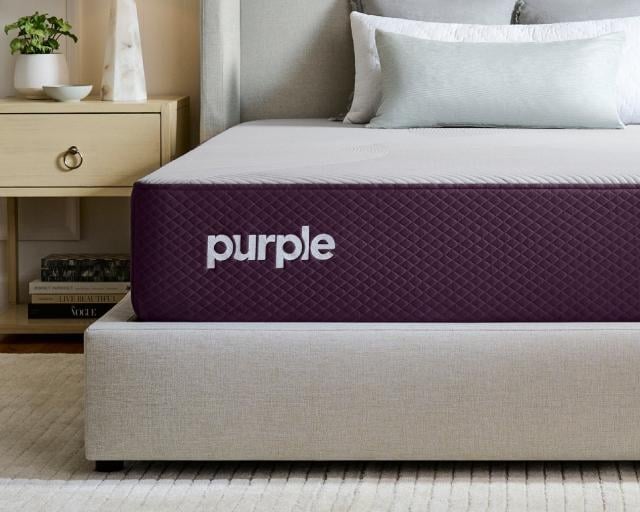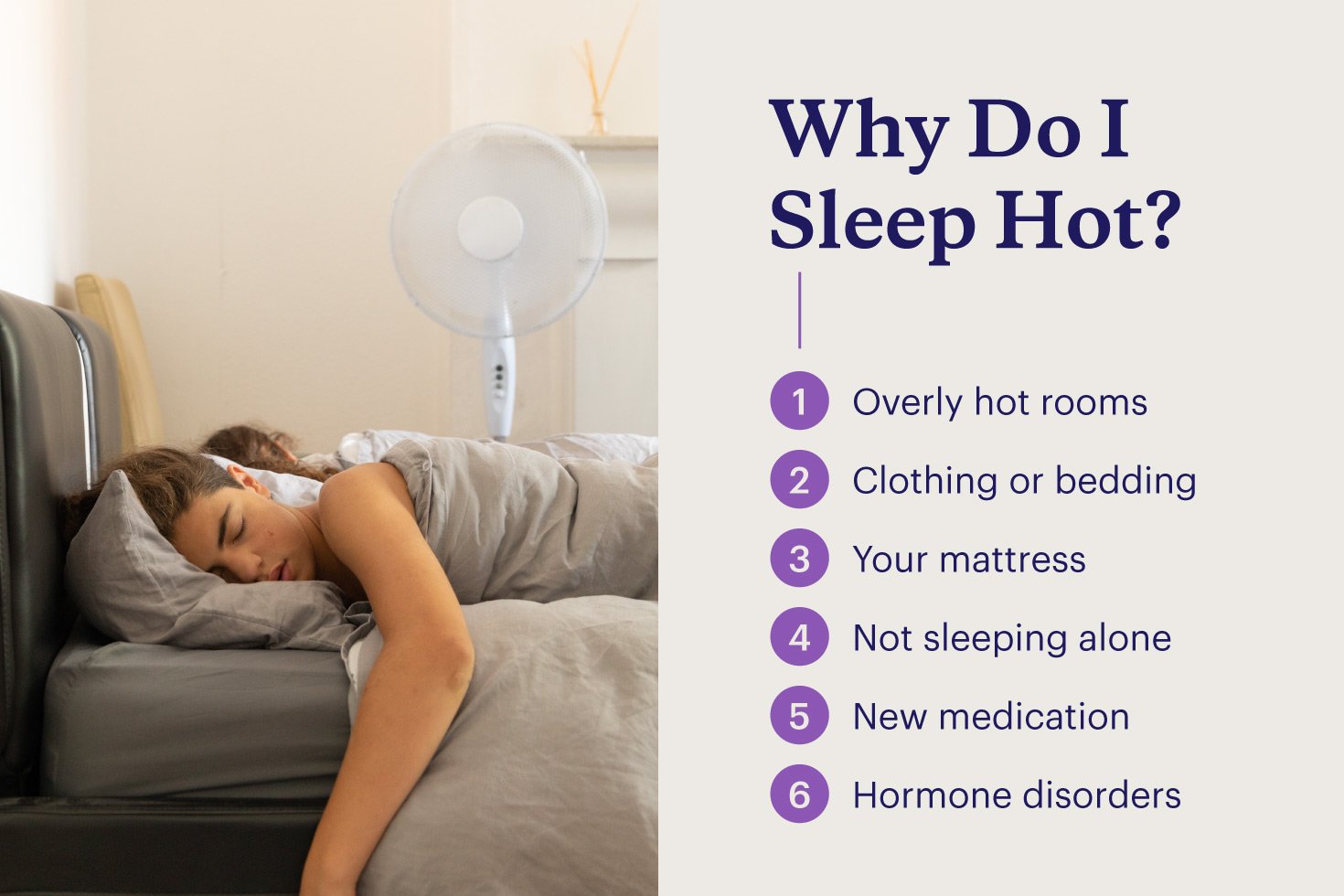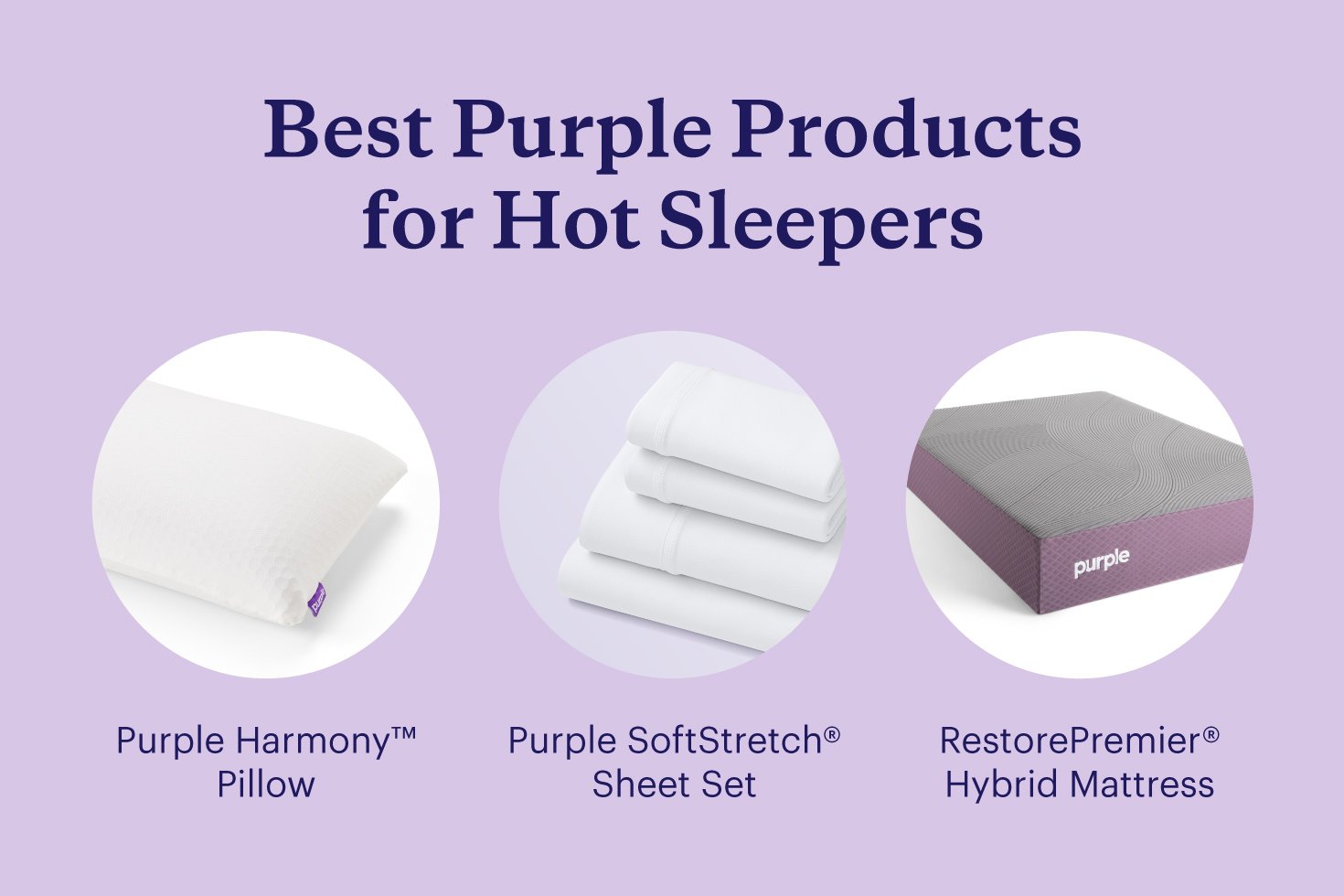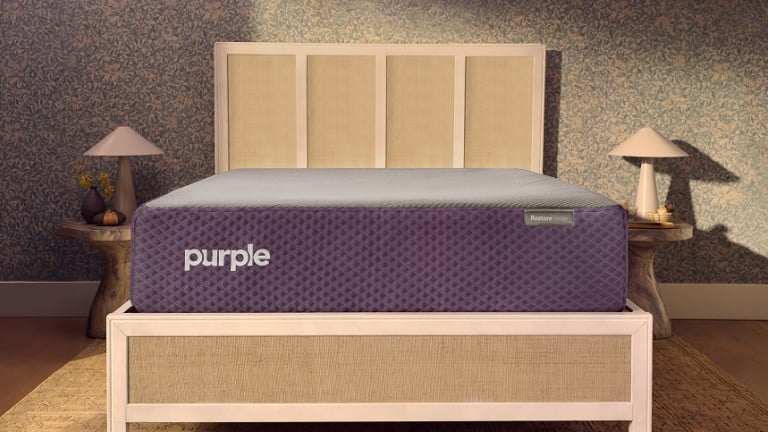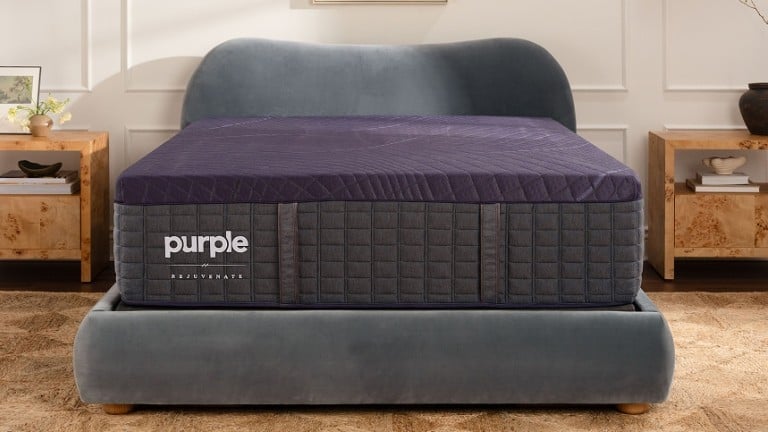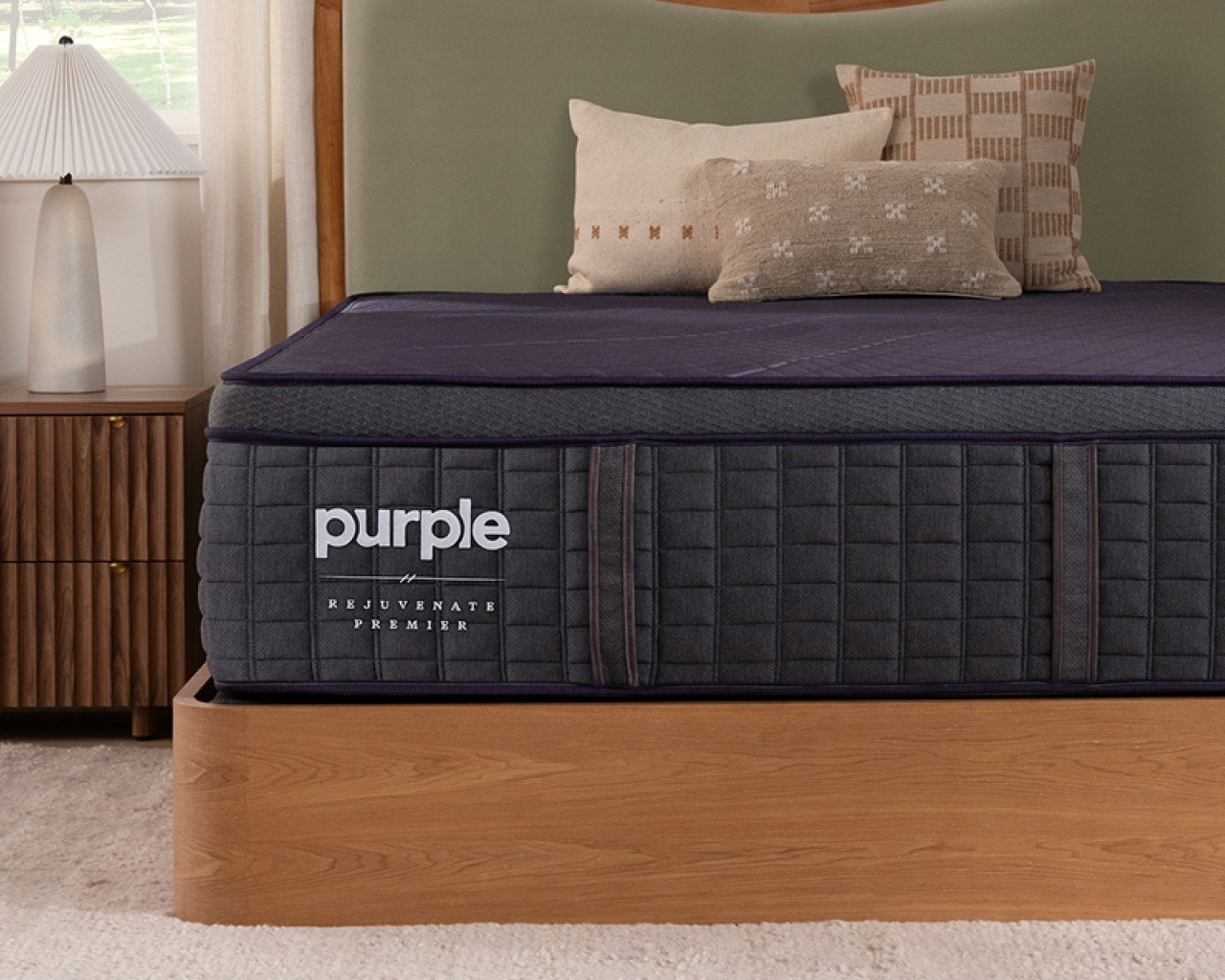
Why Do I Get So Hot When I Sleep? + 23 Tips for Hot Sleepers To Cool Down
Why Do I Get So Hot When I Sleep, Even When It's Cold?
If your room is cool but you still wake up sweating, you may be dealing with an old or deteriorating mattress, warm bedding or pajamas, medication side effects, medical condition symptoms, hormone fluctuations, or high levels of stress.
If you're a hot sleeper, you’re likely familiar with kicking your covers off or sitting in front of your fan for a few minutes in the middle of the night just to cool down. But why do you get so hot when you sleep?
A warm sleep environment is the primary cause of sleeping hot, but other factors can contribute to your night sweats. Feeling too warm can lead to restless or interrupted sleep, and you may lie awake wondering what you can do to fall back asleep.
Fortunately, there are ways to cool down and get quality sleep despite sweltering temperatures. Read on to learn nine reasons you sleep hot, plus 23 tips for staying cool during the night.
*Disclaimer: Thermal test and heat flux study conducted by Purple on Purple hybrid mattresses in 2023.
Why You Sleep Hot: 11 Possible Causes
Higher temperatures tend to wake our bodies up, while lower temperatures help us feel more tired and relaxed.
If you want to have the most comfortable night of sleep possible, you’ll likely need to adjust your sleeping environment. Here’s a list of some common reasons for hot sleep and their respective fixes.
1. Room Temperature
Homes trap a lot of heat during the day, and a warm or humid bedroom makes you more likely to sweat while you sleep.
2. Clothing or Bedding
Clothing and bedding can make all the difference when it comes to sleeping cool or hot, so be mindful of the materials yours are made of. Certain fabrics can serve as insulators when you sleep, including:
- Wool
- Polyester
- Microfibers
3. Your Mattress
Some mattresses aren’t built with hot summers in mind. Memory foam mattresses mold to your body, which can trap heat. Gel memory foam is designed to offer similar supportive benefits with a cooler feel.
Unlike memory foam or traditional spring mattresses, Purple mattresses adapt instantly as you move, thanks to GelFlex Grid® technology. Where memory foam may store heat as it molds to your body, this proprietary hyper-elastic grid has over 1,400 air-ventilating chambers, so you can sleep cool and enjoy comfort that moves with you.
Take our mattress quiz to find the perfect match for you.
4. Sharing a Bed
Cuddling with a loved one is nice, but it may also result in a warmer bed, nighttime sweating, and discomfort.
If you and your partner have different preferences for sleeping arrangements, you may want to consider:
- Spreading out or putting pillows between you
- Getting two blankets or split sheets
- Sleeping in separate beds
5. Nighttime Activities
Exercising or drinking alcohol in the evening may raise your body temperature at night, making it harder to sleep.1,2
6. Your Diet
Some foods can cause heartburn or indigestion and make you sweat.3 Eating too close to bedtime can also disrupt your sleep, and the digestive process may increase your body temperature as it expends energy to digest food.
7. Stress or Anxiety
Elevated stress levels may contribute to fluctuating body temperatures, resulting in disrupted sleep.4
8. Medical Conditions
Temperature fluctuation is a common symptom among critically ill individuals and those with certain conditions, like autoimmune disorders, infections, or hyperthyroidism, which can make your body feel warmer.5
9. Medication Side Effects
If you’ve recently started a new medication, you may want to read the included literature if you start breaking out into sweats around bedtime.
Certain medications — namely antidepressants, aspirin, and certain steroids — can oftentimes lead to night sweats.6 If night sweats are a problem for you, we recommend setting an appointment with your doctor to share your concerns, identify any potential risk factors, and explore your options for treatment.
10. Hormones
Creating too little or too much of a hormone can cause fluctuations in body temperature, leading to night sweats.7
If you’re regularly experiencing night sweats, talk to your doctor about adjusting your treatment or finding other options.
How To Stay Cool at Night: 23 Solutions for Hot Sleepers
Regulating your body temperature is key to maintaining high sleep quality. If you keep waking up warm, try these tips to cool down.
1. Adjust Your Thermostat
The best temperature for sleep is typically between 60 and 70 degrees Fahrenheit. This may be cooler than what you keep your home at during the day, so make sure you’re adjusting your thermostat a few hours before you go to sleep.
2. Use an Electric Fan
Air conditioning is great, but you likely won’t be running it outside of summer. Electric fans are a cost-effective way to bring down your bedroom temperature and provide a nice breeze during the night.
Tower fans and pedestal fans set to oscillate work well for circulating cool air throughout the room.
3. Opt for Cooling Sheets
Breathable bedding can help regulate the body’s temperature and help you sleep cooler at night. If you regularly sleep hot, look for cooling bed sheets, typically made from natural cotton or linen.
The Purple SoftStretch® Sheet Set uses a moisture-wicking bamboo blend to keep you cool overnight. With a sheet set designed for cool sleep, you’ll never kick your sheets off the bed again.
4. Change Your Sheets Regularly
If you’re a hot sleeper, it’s critical to wash your sheets regularly, especially if you’re prone to night sweats. Fresh sheets may keep you cooler at night, and they’ll also help eliminate the bacteria, mites, and other allergens that are attracted to sweat.
5. Rethink Your Sleepwear
You may have a favorite pair of pajamas, but certain fabrics like polyester trap more heat during the night than others. Instead, opt for more breathable fabrics, like natural cotton and linen.
6. Choose a Cool Pillow
Hot sleepers generally look to replace their sheets and mattresses first, but make sure you find a pillow that offers both neck support and coolness to keep you comfortable. The best pillows for hot sleepers are those that remain cool throughout the night without sacrificing comfort and support.
The Purple Harmony™ Cooling Pillow checks all the boxes. Made with a breathable, moisture-wicking mesh cover and proprietary GelFlex Grid®, you’ll never have to flip this pillow over to the cool side. Designed to stay cool all night while supporting your neck, the Purple Harmony™ Pillow provides stay-cool, supportive comfort all night long paired with the cooling mattress properties of a Purple mattress.
7. Stay Hydrated
Part of staying cool while you sleep relates to maintaining healthy habits, like drinking water regularly throughout the day. According to the CDC, water helps you keep a normal temperature throughout the day, which can lead to better sleep at night.8
Be sure you’re drinking the recommended amount of water during the day, but stop an hour before bed to avoid unexpected bathroom trips.9
8. Take a Break From Cuddling
It can be nice to fall asleep in your partner’s arms, but if you find you feel too hot, it may be time to rethink bedtime cuddling. Try experimenting with different couples’ sleeping positions that involve less contact or cut-out cuddling altogether.
If cuddling is beneficial for your well-being and your relationship, consider cuddling with your partner earlier in the evening to avoid sleep disruptions.
9. Try a New Sleep Position
It’s easier said than done to alter your usual sleeping position, but certain positions lend themselves to cooler sleep than others. Training yourself to sleep on your back with your limbs spread out, for example, can help dissipate heat over a wider area, keeping you cooler.
If you tend to sleep in a more curled-up position, your body traps heat more easily, which can lead to hotter sleep throughout the night.
10. Manage Your Stress
Chronic stress or anxiety is unlikely to be the sole culprit of your night sweats, but managing anxious thoughts or daily stress can be beneficial to your sleep quality overall.
Since prolonged stress may raise your body temperature or increase inflammation, coping methods like journaling, meditation, mindfulness, and breathing exercises may help you cool off as you wind down for bed.
11. Take a Shower or Bath
Physically cooling your body down with a cold shower is a great way to decrease internal temperatures and prepare your body for sleep. If cold plunges aren’t your jam, you can also prepare for sleep with a warm bath or shower.
While it might seem counterintuitive, warm baths can lower your core temperature and cool you down for sleep. They may also lower your heart rate and help you relax, preparing your body for a healthy night of sleep.
12. Bring an Ice Pack To Bed
Using an ice pack is an excellent way to cool off during the night if you wake up with night sweats. Starting the night with an ice pack where you feel the warmest can help you fall asleep more easily.
If you have a mini fridge or freezer in your bedroom, consider storing an ice pack in your room in case you need a quick cooldown during the night.
13. Use a Dehumidifier
Humidity is a common cause of hot sleeping, especially during the warmer months. If you live in an area with high humidity, consider investing in a dehumidifier. These tools are designed to remove water vapor from the bedroom, leaving you with drier air and making your room cooler for sleep.
14. Keep Your Blinds Closed
Natural light is great for your overall mood, but remember that sunlight can heat a room throughout the day, leading to hot sleep at night.
If you’re a hot sleeper, consider closing your bedroom blinds during the day. You can still enjoy natural light in your living room and other rooms in your home, but you may want to darken your bedroom for cooler sleep. Investing in blackout curtains is a good way to ensure your room stays dark and cool throughout the day.
15. Prepare Your Room Ahead of Time
Running your fan, closing your curtains, and turning on your dehumidifier while you sleep is helpful, but starting this process earlier in the day will ensure a cool sleeping environment when you’re finally ready to go to bed.
16. Try a Weighted Blanket
While a weighted blanket may sound like a recipe for more heat during the night, the opposite may be the case. Some weighted blankets are designed specifically to cool you off and regulate your temperature throughout the night.
With the added comfort of extra weight, a cooling weighted blanket can be an excellent investment if you’re constantly kicking your covers off to cool down.
17. Lower Your Bed Frame
Turn to science for help sleep cooler at night. Heat naturally rises, so you may find cooler air if you’re sleeping lower to the ground. An adjustable bed frame may allow you to lower your mattress for a cooler night's sleep, and some platform bases sit lower to the floor, as well.
If you can’t lower your current bed frame, explore adjustable frames like the Purple Adjustable Base or a low-platform base like the Purple Platform Foundation.
18. Ditch the Nightcap
Avoiding alcohol before bed has plenty of benefits for healthy sleep. The warm feeling that you might get from alcohol actually results from fluctuating body temperatures. When your body temperature fluctuates during the night, it can result in night sweats, heart rate variability, and poorer sleep in general.10
19. Avoid Caffeine
Like alcohol and spicy food, caffeine and sleep do not play nice. Drinking coffee or soda too close to bed can cause your body temperature to fluctuate during the night, potentially leading to hotter sleep.
If you’re cramming for a test or working late, try to avoid using caffeine to fuel yourself. You may end up experiencing unexpected night sweats or be unable to sleep at all.
20. Mind Your Diet
What you eat during the day can impact your sleep quality, and while some foods can help you sleep better, there are several things you should avoid if you want to sleep soundly.
Spicy food, for example, can upset your stomach and increase your body temperature, resulting in poor sleep quality. If you had a spicy dinner, give yourself a few hours to digest before bed — and be sure to drink lots of water.
21. Keep Electronics in a Separate Room
While it may make a small difference in your room's overall temperature, your electronics do emit heat. Consider shutting down electronics entirely at night or keeping them in a separate room from where you sleep.
Separating your electronics from your bedroom can also benefit your overall sleep quality as it keeps you from looking at blue light screens too close to bedtime.
22. Avoid Exercising Too Close To Bed
Aerobic exercise can be excellent for helping you rest if you’re too stressed to sleep, but it raises your heart rate, which can make you feel hot when it’s time to go to sleep.
Try to space out exercise and sleep by at least two to three hours. If you need to squeeze in a workout right before bed, try incorporating meditation so you can wind down quicker.
23. Invest in a Cooling Mattress
Sometimes, a new mattress is all you need to sleep cooler at night. The best mattresses for hot sleepers have heat-regulating qualities that help you stay cool. If you experience night sweats and sleep hot on your current mattress, look for a mattress with advanced cooling technology like Purple’s GelFlex Grid®.
Named the best overall cooling mattress by Men’s Health and Good Housekeeping, the Purple RestorePremier®™ Hybrid Mattress sleeps up to 4x cooler* than major competitors.11,12 With Ultra Comfort Foam sitting on each coil, the RestorePremier®™ offers targeted support and motion isolation while simultaneously working to dissipate heat away from your body.
*Disclaimer: Thermal test and heat flux study conducted by Purple on Purple hybrid mattresses in 2023.
Stop Overheating at Night With Purple
Hot sleeping can generally be solved by making a few small changes to your sleep environment and lifestyle. When you put these small changes into action, you’ll likely experience better sleep and, as a result, more energy during the day.
Purple has been reinventing comfort for decades. With the proprietary GelFlex Grid® dissipating heat as you snooze, you’ll stay cool and comfortable all night long. Paired with cooling sheets that work like the Purple SoftStretch® Sheets, a cooling mattress can help you fall asleep and stay asleep more comfortably night after night.
FAQ
If you frequently wake up sticky with sweat, you may be a hot sleeper, meaning you tend to feel warmer than average overnight. Sleeping hot may mean you wake up sweating or have trouble staying asleep because you can’t get comfortable.
Your internal body temperature naturally fluctuates throughout the day and overnight, but for most people, it lowers while you’re sleeping. As your body cools down, you may feel warmer because the heat escapes through your skin.
Certain medications, sleeping with warm blankets, and wearing warm pajamas can also raise your temperature.
Your mattress may contribute to your nighttime discomfort by trapping heat against your skin. If you think your mattress is to blame, it may be because of the following factors:
- Mattress material: Some types of mattresses, like memory foam, may provide pressure relief but also trap heat. Opt for more breathable options like GelFlex Grid®, latex, or hybrid mattresses.
- Mattress age: As mattresses age, they may start to break down, minimizing airflow.
- Bedding: Thick, heavy, and warm bedding can be cozy in the colder months, but it can also make you sweat more than lighter sheets and blankets.
If you want to stop being a hot sleeper, you should first reevaluate your sleeping environment. You can make small changes like:
- Running a tower fan in your room
- Closing your blinds during the day to limit heat from sunlight
- Reducing the temperature in your room a few hours before you go to sleep
Beyond these changes, opting for cooling sheets and pillows, as well as a cooling mattress, can help regulate your body temperature. If none of these changes help, you may need to talk to your doctor.
Natural fibers are the best materials for staying cool while sleeping, including:
- Cotton
- Linen
- Bamboo
Some heat-trapping materials to avoid if you’re a hot sleeper include:
- Microfibers
- Polyester
More To Explore
Level up your sleep routine with our most-loved products.

